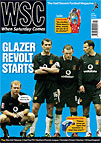 John Williams was down and his team were out in Istanbul. What happened next hasn’t solved all Liverpool’s problems, but certainly eased the pain
John Williams was down and his team were out in Istanbul. What happened next hasn’t solved all Liverpool’s problems, but certainly eased the pain
Six minutes. Think about it. What, exactly, can you do in six minutes? Run a bath, perhaps. Take that welcome half-time pee break – or, if you’re watching at home, make a nice cuppa. Or else cruise eBay for that oh-so-difficult-to-find special gift? It will probably take about six minutes for you to read this article – though you might consider doing it just a little more carefully than that. Six short minutes. They can easily disappear, even while you think. Or else while you dream.
Alternatively, you might just try turning European football on its head in 360 seconds. This might involve, for example, confounding your own downtrodden travel-weary supporters and every single global football pundit in the process. In fact, you might try selecting, for your biggest ever match abroad against vaunted European opponents, the fragile and pea-hearted Harry Kewell over the immense and reliable Didi Hamann and giving AC Milan a three-goal start in a European Cup final. And this was an even better Milan side than the Ruud Gullit and Marco van Basten version their current manager Carlo Ancelotti played for, or the one that humiliated Barcelona 4-0 in the 1994 showpiece. Hadn’t the Italian foolishly told us as much just before the 2005 final?
The Anglican bishop of Liverpool, James Jones, recently described the people of Liverpool as “a strange mixture of pessimism and optimism”. “Go into a meeting announcing great news,” he argued, “and they will gloomily retort that it will never happen. Go in announcing terrible news and they’ll say, ‘Don’t worry, it will work out brilliant’.” The man is not far from the truth – but not this night, not in chilly Istanbul. I can tell you that no one in red here was thinking that this first-half carnage would turn out “brilliant”.
Three goals down and light years from being even competitive, we had talked coldly at half-time in the spartan and unwelcoming Ataturk Stadium – a positively surreally awful venue, even by UEFA’s appalling standards – about what we could possibly hope for in part two of this unfolding nightmare. Hope for? We just wanted this to end, to get back to the warmingly spaced-out Pete Wiley concert outside, or even on to the buses that we knew would take hours to get us back to the friendly bars of downtown Istanbul. We wanted, above all, to be somewhere else. But we came up, nevertheless, with a shortlist, a minimum aim in this harsh new world of imminent defeat.
First, avoid a European Cup final record loss: Benfica had scored five goals in the 1962 final and Real Madrid had scored seven in 1960. But on both occasions their opponents had managed to score three goals of their own. On a few more occasions the winners had scored four. Liverpool might just avoid conceding seven here: modern elite clubs tend to wind down anyway when the damage is done, to save fellow professionals from complete humiliation. But could we possibly score even one against Jaap Stam, Paolo Maldini and all his film star-looks mates?
We needed a goal, a consolation at least, something to cheer. Otherwise it was 4,500 miles away for 90 minutes of head-in-hands torture. We deserved something. Get a solid shape to the team – get Hamann on the field for Rafa’s sake. Make Kaká realise he’s not in one of those Brazilian beach workouts. Dig.
You know the rest: the six-minute, second-half destruction of Milan. To be honest, Steven Gerrard had been playing patchily for months, racked by his personal ambitions and by his very public social attachments to the club, the fans and to the city. But now he reverted to type, an old-style storm in midfield, a point-blank Huyton refusal to accept what had seemed to be inevitable. Vladimir Smicer’s contribution surprised more people, but Smicer has more quality and heart than his critics allow – if not a body robust enough to show us more. This was his parting gift. Xabi Alonso, a new arrival, showed class and desire, surely heralding a bright future for him at least.
And then it was our night as surely as it had previously seemed to be Milan’s. We all, indeed, may “dream of a team of Carraghers” – and of a secure new Liverpool direction off the field. Chairman David Moores now seems more determined than ever to hold on to control, while the costs of a new Anfield stadium rise, it is alleged, by £1 million a month. We are no closer to securing the necessary investment – though this kind of global heroics can help a lot. The possibility of sharing with Everton – sure Champions League material while we await UEFA’s nod for 2005-06 – seems an ever-distant prospect. Moores’ main rival, the millionaire builder and Reds fan Steve Morgan, was probably as gobsmacked and wide-eyed in Istanbul as the rest of us. But this isn’t over: we may still need his cash to stay where we just landed.
From WSC 221 July 2005. What was happening this month